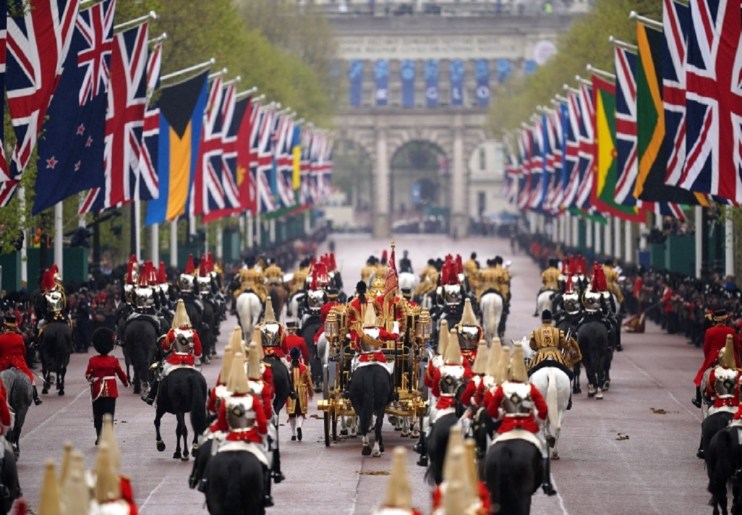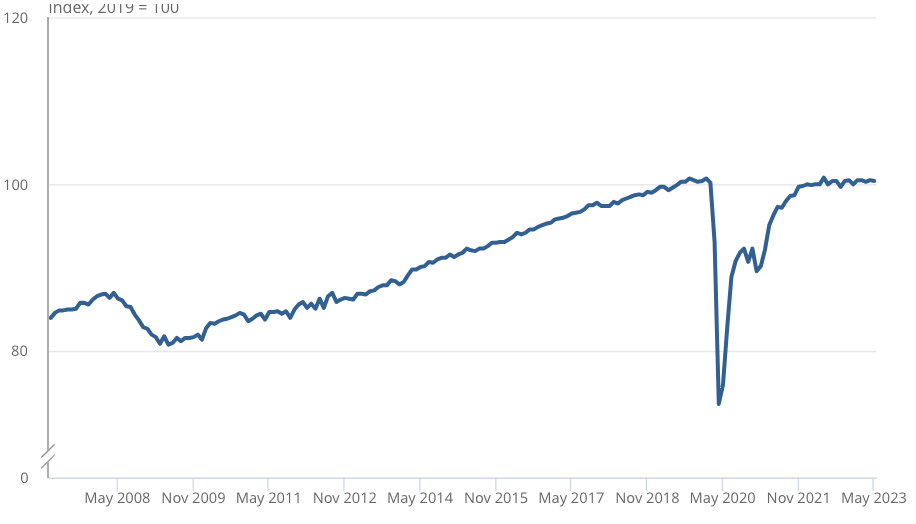King’s coronation steers UK economy back into red as GDP shrinks 0.1 per cent in May

Lost work owing to the additional bank holiday to celebrate the King’s coronation has sent UK economic growth into reverse, official figures out today reveal.
UK gross domestic product (GDP) contracted 0.1 per cent in May, a much smaller drop than the City expected and down from a 0.2 per cent expansion in April, according to the Office for National Statistics (ONS).
May’s negative figure was driven by activity among construction firms and factories flagging, the ONS said. Britain’s all important services economy was flat over the month.
Economic activity took a knock from workers having more than usual time off in May to mark King Charles’s ascent to the throne. The month usually has two bank holidays, with the coronation giving Brits a third to celebrate, and have a day off work.
Industries that tend to shut down most if not all activity on bank holidays, like financial and professional services, contributed to May’s output drop.
An increase in leisure spending as families used their additional time off to head to pubs, bars and restaurants was not enough to offset the GDP contraction. Fewer workers striking in May softened the monthly output drop.
“Despite the Coronation Bank Holiday, pubs and bars saw sales fall after a strong April. Employment agencies also saw another poor month,” Darren Morgan, director of economic statistics at the ONS, said, possibly signalling companies are paring back recruitment drives.
The GDP hit from one-off bank holidays has blunted over the last two decades mainly due to more businesses deciding to stay open. Greater digitisation of the economy has meant workers have more opportunities to spend their cash on non-working days.
Britain’s GDP decline though will amplify the chances of the UK slipping into a technical recession, defined as two back-to-back quarters of negative growth.
In the three months to May, the economy registered zero growth, meaning a slight reduction in consumer spending in the coming months may be enough to tip the country’s quarterly growth into negative territory.
The economy is just 0.2 per cent larger than it was before Covid-19, meaning the country has barely expanded at all in the last three and a half years.
UK GDP is barely higher than before the pandemic

Samuel Tombs, chief UK economist Pantheon Macroeconomics, characterised the economy as being “listless,” adding that although certain sectors had absorbed a hit to their finances from the lost working day, “the net impact on GDP appears to have been very small”.
“The bank holiday and strikes make it hard to judge the true health of the economy. But our sense is that underlying activity is still growing, albeit at a snail’s pace,” Paul Dales, chief UK economist at Capital Economics, said.
Chancellor Jeremy Hunt recognised the extra bank holiday pegged back GDP, adding that “high inflation remains a drag anchor on economic growth”.
Bank of England officials have bumped up the UK’s official interest rate 13 times in a row to a near 15-year high of five per cent in an attempt to hobble inflation.
They are tipped by financial markets to repeat last month’s jumbo 0.5 percentage point increase at their next meeting on 3 August. Inflation numbers due next Wednesday are likely to edge the monetary policy committee (MPC) toward a larger rate rise if they top expectations.
Dales added that the UK economy is on course to just about beat the Bank’s second quarter GDP forecast which – while softening household hardship – signals activity is holding up better than expected amid tighter credit conditions.
Restrictive monetary policy is a fairly stiff medicine to control inflation. It, in theory, eases price pressures by raising unemployment, heaping pressure on the housing market and making borrowing less affordable.
In its bi-annual financial stability report yesterday, the Bank said 4.5m homeowners have rolled on to mortgages with higher rates since they started tightening policy in December 2021.
A further 4m mortgagors are forecast to roll on to more punitive contracts by 2026, meaning the suggesting the economy could slow sharply over the coming months. Some of that group may see their monthly mortgage bills by at least £500 in three years.